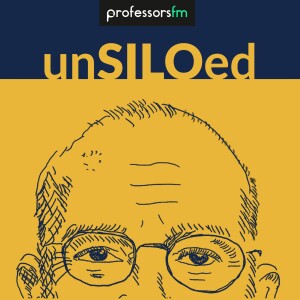
380. Examining the History of Mind feat. George Makari
 2024-02-05
2024-02-05
For centuries, the health of the body was the province of doctors while the health of the soul was the domain of the clergy. What happened with the discovery of a concept of mind as thinking matter? In this episode, we trace the emergence of mind and mental health as a new aspect of what it means to be human.
George Makari is a psychiatrist, historian, and the author of three books: Of Fear and Strangers: A History of Xenophobia, Revolution in Mind: The Creation of Psychoanalysis, and Soul Machine: The Invention of the Modern Mind.
George and Greg discuss the transformation in the way we perceive the mentally ill, thanks in part to the contributions of Philippe Pinel and others who dared to challenge the status quo. They explore the early intersection of sensibility, vitalism, and literary movements that have shaped modern mental health practices. They also dive into xenophobia, where it came from, and how it persists.
*unSILOed Podcast is produced by University FM.*
Episode Quotes:Do people in the world of intellectual history need to spend time thinking about medicine and the history of medicine?
02:38: When you went in search of the history of mind, what you found was maybe a history of the mind through the lens of philosophy. Charles Taylor wrote a good one like that. But the more and more I looked into it, it became so clear that the notion of the mind was highly implicated in science, medicine, politics, and broader social change. And that a lot of our 21st-century categories apply back to a time where they didn't really exist…[03:38] The argument in the book is that claims about these major human essences—the soul, the mind, the brain—have very important socio-political ramifications and, not just downstream, but can be affected by socio-political cultural beliefs. So, I tried to tell that bigger story—medicine being part of science, being part of politics—and trying to piece out how these different kinds of things interacted in the creation of the kind of state that we're in now, thinking about soul, mind, and body.
Are we all a little mentally ill?
26:32: Sensibilities getting disrupted, causing depression or something like that. We are all, potentially, the victims of that. So, there is this notion that the mind is a fragile thing. It's not simply that God gave us one, and it's fine. It's part of the body; it's part of the physiology; it's part of this sensible creature who the environment can deeply impact and who can deeply impact the environment.
On the origins of xenophobia
33:12: I did a little bit of etymology and whatnot and found that the Greeks actually, in antiquity, had never used the word xenophobia. And that was critical because phobos in antiquity is just fear. It doesn't mean anything medical. But by the time the term gets invented in the late 19th century, phobia was a medical term, and there were a multiplicity of phobias that had emerged in the late 19th century, up to 75 different ones. And xenophobia was one of them, so that it was now an irrational fear, and that makes all the difference, that adjective. It's an irrational fear; it's a mental illness; it's not just a fear. And so, when you talk about the irrational fear of the stranger, that becomes one of the origins of the concept of xenophobia. As it kind of makes its way.
The "Other Anxiety" of encountering difference
48:03: Bringing people from foreign worlds together works to some extent, and I call that other anxiety. I was like, we shouldn't call that xenophobia because we all have that. If I meet someone who looks different than me, who speaks a different language than I do, and who worships differently than I do, I am going to have some anxiety about what goes on with that person and how they're different and how they're thinking about me. So that's almost universal, and we should think about that as the easiest part of the problem: bringing people together.
Show Links:Recommended Resources:
- René Descartes
- John Locke
- Pierre Gassendi
- Baruch Spinoza
- Francis Willis
- Philippe Pinel
- Bethlem Royal Hospital
- Charenton-le-Pont
- Sensibility
- Vitalism
- Franz Mesmer
- Franz Joseph Gall
- G. Stanley Hall
Guest Profile:
- Faculty Profile at Weill Cornell Medical Center
- Faculty Profile at Yale Universty
- GeorgeMakari.com
- Wikipedia Profile
His Work:
- Of Fear and Strangers: A History of Xenophobia
- Soul Machine: The Invention of the Modern Mind
- Revolution in Mind: The Creation of Psychoanalysis
- Academic Publications
More Episodes
Create your
podcast in
minutes
- Full-featured podcast site
- Unlimited storage and bandwidth
- Comprehensive podcast stats
- Distribute to Apple Podcasts, Spotify, and more
- Make money with your podcast
It is Free
- Privacy Policy
- Cookie Policy
- Terms of Use
- Consent Preferences
- Copyright © 2015-2024 Podbean.com






